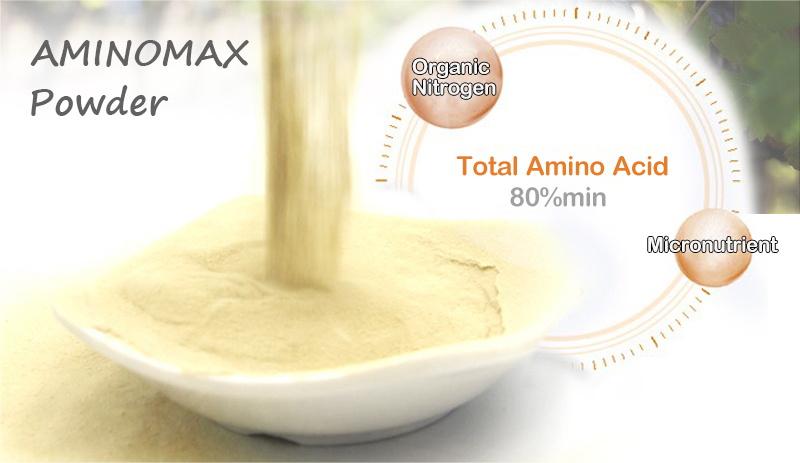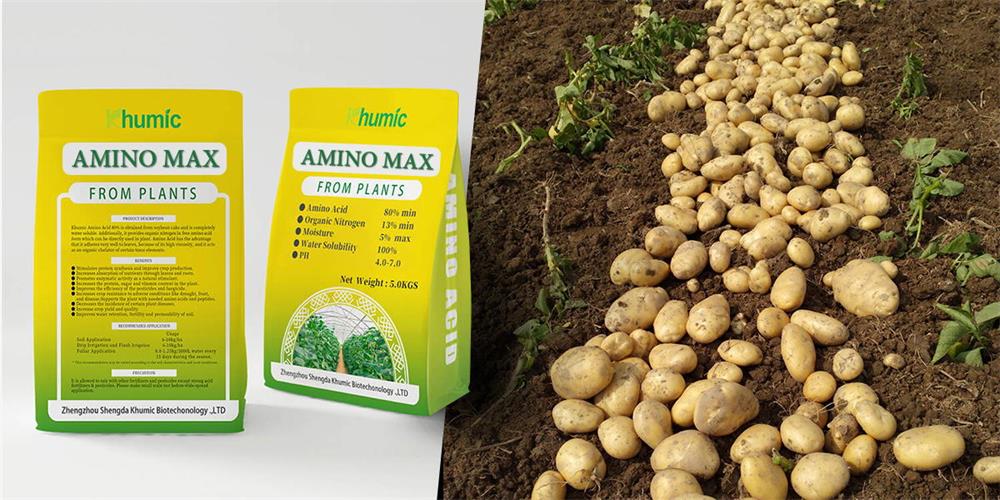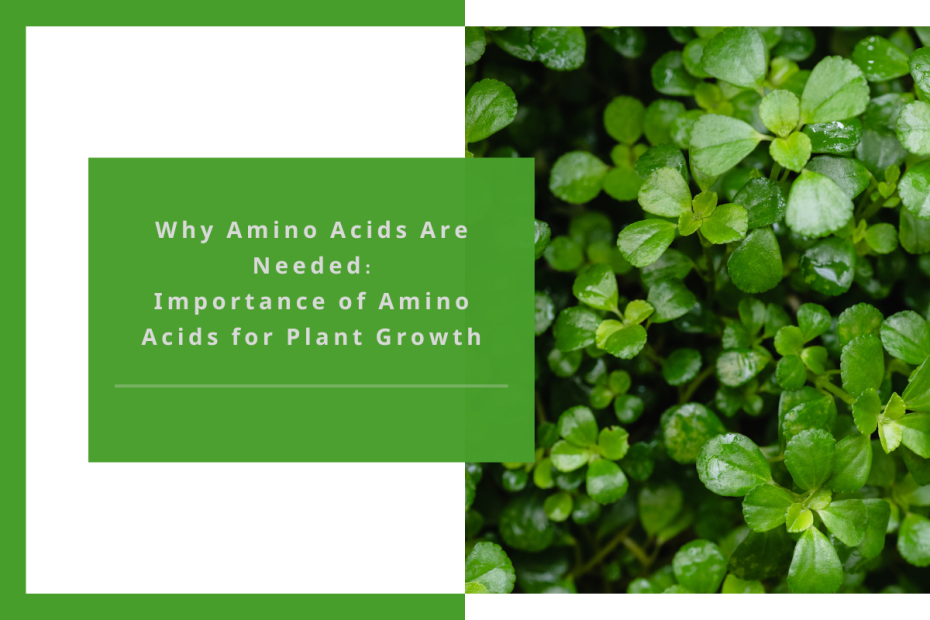Introduction
In the vast field of plant biology, a key element is the building block of growth and development—Amino Acid. These organic compounds play important roles in a variety of critical functions in plants, animals, and all other organisms, contributing significantly to their overall health and vitality, and are especially of increasing importance in plant development and stress defense. But why exactly do plants need amino acids? Let’s delve into the complex world of plant biology and uncover the importance of amino acids in plant growth and health.
What Are Amino Acids?
Amino acids are small molecules, components of proteins, structural supports of cells, and precursors of various complex nitrogen-containing molecules. Essential to the structure and function of all living things, including plants. These organic compounds contain carbon, hydrogen, oxygen, and nitrogen to form chains that make up proteins critical to plant growth, iron-containing organic groups required for biological activity, and chlorophyll required for plant photosynthesis.

Types Of Amino Acid
Plants require 20 standard amino acids for various biological processes. These amino acids can be divided into two categories: essential amino acids, which cannot be synthesized by plants and must be obtained from the soil or through other means; and non-essential amino acids, which plants can produce themselves.
There are many amino acid fertilizers on the market for essential amino acids. According to the raw materials, it can be divided into plant-derived amino acid fertilizers and animal-derived amino acid fertilizers; according to the added organic and inorganic nutrients, it can be divided into amino acid organic fertilizers, amino acid mineral fertilizers, amino acid organic-inorganic compound fertilizers, etc.; according to the fertilization method, it can be divided into amino acid-containing water-soluble fertilizers. , amino acid foliar fertilizer, amino acid compound fertilizer, etc.; according to the form of fertilizer, it can be divided into amino acid liquid fertilizer and amino acid solid fertilizer.
Amino acid fertilizer is a fertilizer made with amino acids as the main component and a certain amount of organic or inorganic nutrients added. This fertilizer offers a variety of benefits, including providing complete nutrition, improving plant disease resistance, and improving plant quality.
The Role Of Amino Acid In Plant Growth
A lack of amino acids in plants can cause a variety of symptoms, including poor growth, yellowing of leaves, reduced yields, and increased susceptibility to disease. An adequate supply of amino acids is essential for plants to promote protein synthesis, provide nutrients, promote growth, improve stress resistance, improve soil structure, and promote sustainable plant development.
Protein synthesis
Amino acids are the building blocks for protein synthesis, and proteins are essential for the structure and function of plants. Proteins synthesized in plants play crucial roles in various physiological processes, including enzymatic catalysis, structural support, molecular transport, and signaling pathways. They are essential for plant growth, photosynthesis, response to environmental stimuli, defense mechanisms against pathogens, and overall plant health and development.
Nutrient absorption
Amino acids can be directly and quickly absorbed and utilized by plants. It has the characteristics of fast absorption, quick effect, and good effect. They promote plant uptake of nutrients from other fertilizers in the soil and help transport essential nutrients from the soil into plant cells, ensuring proper growth and development of crops. Amino acids also play a role in nutrient storage and reuse within plants.
Stress response
Amino acids act as stress protectors for plants, enhancing plants’ resistance to various adverse environments, such as high temperature and strong light, low-temperature freeze damage, drought and flood, wind and rain, diseases and insect pests, etc. Prevent, alleviate, reduce, or eliminate the phenomenon of green and yellow leaves on plants, promote plant growth and development, play the role of rooting, strong seedlings, strong trees, increase production, and improve quality, thereby making plants grow more vigorously.
Sustainable development
Amino acids are green, pollution-free, and residue-free functional fertilizers. They will not cause any pollution or damage to the soil but can improve and maintain the soil to a certain extent. At the same time, amino acids play a key role in plants’ post-disaster resilience by regulating osmotic balance and antioxidant activity.
Organic nitrogen
Part of the nitrogen absorbed by plants comes from protein and amino acid synthesis. By providing nitrogen in a bioavailable form, the plant’s need for nitrate and ammonium is reduced (excess nitrate produces faster growth, which in turn causes cells to elongate. As rapidly growing cells form, the cell walls stretch and become Thin. This weakens the tissue, making it an easy target for pests and other invaders), allowing cells to grow more naturally and have a stronger shape. This results in stronger plants, healthier cells, and greater resistance to stress and attack.
Mineral chelation
One of the most important roles of amino acids is to increase the bioavailability of nutrients. Plants do not easily absorb certain nutrients due to their molecular structure, ionic charge, etc. Amino acids effectively “package” these unavailable minerals so that plants can absorb and transport them (the process of “packaging” nutrients in acids is called “chelation”). Chelating with amino acids increases the amount of minerals available in the nutrient solution or growing medium for uptake and spread throughout the plant.
How To Improve The Amino Acid Utilization Rate Of Plants
Factors such as soil pH, nutrient levels, microbial activity, and environmental conditions all affect plant availability of amino acids
Organic amendments can be added to the soil to increase the availability of amino acids to plants. The breakdown of organic matter releases amino acids into the soil, providing plants with a natural source of these essential nutrients. In some cases, supplementing with plant amino acids can help promote growth and development. Khumic’s AminoMax plant-derived amino acid fertilizer can provide plants with a direct source of amino acids, promote crop flowering and fruiting, fruit enlargement, increase yield, extend shelf life, promote sugar conversion, and increase fruit sweetness.

Conclusion
Amino acids are indispensable for plant growth and health, are building blocks of proteins, and play crucial roles in various physiological processes. Making full use of amino acid fertilizers to supplement amino acids can help optimize plant growth and health, enhance plant absorption of nutrients and resistance to harsh environments, and ensure that vegetation is robust and resilient.
Khumic’s Amino Acid Fertilizer provides the amino acids and peptides your plants need to stimulate protein synthesis. Increases nutrient absorption by leaves and roots; water retention, fertility, and permeability of soil. Improves crop yields, insecticide and fungicide effectiveness, and crop resistance to harsh environments. Promote the rapid recovery of crops after disasters.
FAQ
1. Can plants survive without amino acids?
Plants require amino acids to carry out important biological processes, and a lack of these organic compounds can stunt their growth and development. While plants can synthesize some amino acids, they rely on external sources for others.
2. How do plants obtain amino acids?
Plants can obtain amino acids through root uptake from the soil, a symbiotic relationship with microorganisms, or through the external application of amino acid supplements.
3. Are all amino acids beneficial to plant growth?
While all amino acids are essential for a variety of plant processes, some play a more important role than others in growth and development. Understanding the specific needs of plants can help optimize amino acid supplementation.
4. How can I tell if my plants are deficient in amino acids?
Symptoms of amino acid deficiency in plants include stunted growth, yellowing of leaves, reduced yields, and increased susceptibility to disease. Conducting soil tests and plant tissue analysis can help identify deficiencies.
5. Can amino acid supplements improve plants’ ability to adapt to environmental stress?
Yes, amino acid supplements can enhance plant resistance to environmental stress by modulating osmotic balance, antioxidant activity, and stress response mechanisms. Supplementing them with plant amino acids can help them cope with adverse conditions and maintain optimal growth.
